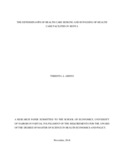| dc.description.abstract | According to the Constitution of Kenya (2010) and the Kenya vision 2030, everyone has the
right to the highest attainable standard of health. In light of this, the health policy expects to
make the realization of the right to health by all Kenyans a reality. This is achieved through
policy development on health care provision which involves establishment of health care
facilities. However, people make deliberate choices for their healthcare needs based on factors
such as visiting facilities with good accreditation, visiting facilities which other people have
visited and shared experiences of cleanliness, communication with health care workers and many
other aspects which may not always come to the limelight. The existing policy on an individual’s
role in adoption of appropriate health practices and health care seeking behavior leads to
realization in the country’s health goals. Therefore, this study sought to investigate and estimate
determinants of health care seeking and bypassing of health facilities in Kenya. The study has
utilized Kenya household health expenditure and utilization survey 2007 with the aid of binary
logit model to estimate factors influencing bypassing of health care facilities by patients in
Kenya. At 5% significance level; age, no education, belonging to poor or middle wealth
quintiles, government ownership of health facilities, satisfaction of waiting times and suffering
from chronic illness were found to be statistically significant. However, being elderly, being
from a poor wealth quintile, being a public or government health facility and being satisfied with
the waiting times respectively reduced the likelihood of bypassing while having no education,
belonging to middle wealth quintiles and suffering from chronic illness contributed to the
increased probability of bypassing nearby health facility in the process of seeking health care.
Based on these findings, the study therefore suggests that there is need for creation of awareness
on healthcare services provided by the respective facilities while encouraging population in the
middle wealth quintiles to consume health care services at health care facilities located nearby to
enhance proper utilization of those facilities. Also, on the other hand, the Government through
the State department of Health need to equip health facilities with deliverables and relevant
equipment required for patients suffering from chronic conditions. | en_US |

